
The 200-year-old K-12 system harbours a well-kept secret—it’s too slow and limited for limitlessly learnable children. In fact, three-to-five-year-olds will be the last to yield to GenAI, AGI, ASI, and beyond. Fortunately, it’s no longer a secret: an AI-powered ‘infant artificial being’ already outperforms most of us.
Simply put, if we sustain the innate human ‘LearnAbility,’ AI-human synergy shall ignite an unprecedented virtuous cycle of progress and potential.
Why was this secret embedded? To secure a humankind-wide mass education model—K-12—built on age-based grades, not ability-based learning. It served its purpose well, but AI and the 4IR are now upending it!
Cutting to the chase, academic acceleration – personalised pace & propensity - is the new K-12, not just an option for the gifted (ignored in K-12). In fact, Acceleration is the natural mode of human learning; wisdom belongs to the accelerated. Acceleration is brain-right, brain-bright, and brain-might.
“While a heavy school bag is a physical burden, it pales in comparison to the ‘burden of non-comprehension.’ … Very little, fully comprehended, is far better than a great deal, poorly comprehended, … those who refuse to compromise with non-comprehension … - they are potentially superior to those who just memorise.” – Prof Yashpal Committee, 1993
Every concept clarity is priceless! Opens new vistas, new imaginations!
Indeed, a free-wheeling learner child in a rich intellectual and cultural environment, and around leaner adults, will blaze a new trail, enriching the world too. Academic acceleration is 100% achievable for 100% children, done right!
 ?
Why
?
Why  ?
Who is
?
Who is  meant for?
Download
meant for?
Download  App
App 

‘Academic Accelerator’ (AA) is the Terminal ‘Human Technology’ to raise/educate
EVERY child to be assertively contemporary for the world of their adult life (e.g., for a child born in
2025, it is the world of 2045+.)
AA peerlessly embodies the academic/non-cultural resources for EVERY society/community/family.
What AA powers is humanity’s first 100% personalisable for pace and learning propensity (we call it ‘K-12
A-Z’); we pioneer age-free, grade-less, curricula-irrespective, universal curricular+ academic reading
resources (including ‘(entire) K-12 mathematics that is read’).
Humankind’s eternal dream of ‘same-outcome education’ for all 18-year-olds stands realised in K-12 A-Z. The
entire academic resource is threaded by the natural, logical, and experiential of the respective domains,
creating the world’s first learner-focused curricular resources.
Unprecedented economic miracle, peace, and (true(r)) democracy awaits ahead in our lives.
Humankind is unfolding mathematically—spirally, secularly, and virtuously! The
‘All-Read and Mathematised Mind’ AI (GenAI, AGI, ASI …) is a nonpareil omniscience that pervades ‘most
aspects of life for most of us’! It is EVERYTHING rolled into one – resources, decision-making,
infrastructure, and production!
AI is the most enabling ‘human technology’ ever—it uniquely complements and supplements EVERY human on
demand. No one has ever been potentially such omnipotent.
Naturally, ALL children and adults must be primed to ride the AI tiger; that is all needed to turn all
adults into net producers (of wealth and (social) good).
Thus, honing meta-intelligence (through creative, critical, analytical, and multi-discipline thinking) is
now THE educational goal.
That is, to lay an organic foundation for competitively and continuously superior thinking skills in
harnessing AI.
Hands-on parents, home-schooling families, and schools. Because parent education,
teacher development, and lesson planning have become urgent challenges, we step in the gap with the
perpetual solution: Nurturing the much-needed adult academic peers in every parent and teacher; after all,
children are the product of their environment.
Pertinently, ‘K-12 A-Z’ dramatically simplifies academic content. For example, Primary and Middle school
mathematics has been sharply delineated into nearly 400 concept strands, and each has a story, explained
examples, and a few conceptual exercises too. On the other hand, ‘Civics’ is divided into 26 chapters,
starting from ‘The idea of a nation’ to ‘Re-inventing nations’ with unparalleled 190 case studies from 95
countries.
K-12 A-Z is ALL the missing links in the textbooks, thus, empowering EVERY parent and teacher to appreciate
and address the logical and academic queries of EVERY child.

To the point, the most comprehensive K-12 Mathematics-curricula concepts are teachable in 5 to 50 hours! To the motivated and competent readers, it may just be 5 hours; they need exposure to mathematical thinking, the questions to ask in mathematics, and they can then READ away the ‘Family Edition’ of K-12 books, and ‘converse’ with AI to supplement.
In fact, NO one may need 50 hours, because if one is not engaged, not motivated to learn to ‘read mathematics’ (reading and conversations are the ONLY two means of true engagement), any number of hours would not help (as is the reality of mathematics education.)
‘Cent Percent Mathematics’ is the ‘dream genre’ of curricular mathematics books presenting peerlessly narrated formal mathematics. EVERY one will succeed in mathematics education, here on; all adults will discover the ‘real mathematics’ geniuses in them; and close their past fears of the ‘school mathematics.’
‘Mathematised mathematics,’ our phrase to differentiate from the ‘school/textbook mathematics,’ unprecedentedly builds on the fact that mathematics is ‘a priori knowledge.’ Thus, NO human can ever struggle in mathematical thinking and appreciating quantitative relationships; all adults know that there are 16 half apples in 8 apples (ironically, school mathematics would just say 16, and this IS confusing to the rational human mind.) In fact, the overwhelming majority of us branded ‘weak in mathematics’ are just ‘weak in what schools call mathematics,' not the ‘real mathematics’.
Mathematics (the real one, unlike what the abstracted textbook mathematics) is a language, the medium through which we express our best-tested understanding of the rigidly ordered, repetitive, patterned dynamics of nature, in fact, the universe. And, the consequence of mathematics as a language is immensely different and distinct from mathematics education – mathematics most uniquely powers meta-intelligence (critical, creative, and analytical thinking), and mathematics education must secure the same for ALL. No less, AI uses mathematics as a language!
Expectedly, mathematics education (at the school level) must be firmly rooted in logic, language, and visualisation (of everyday quantitative experiences.) And, this is what Cent Percent Mathematics brings to one and all, globally!
Mathematics (the real one, unlike what the abstracted textbook mathematics) is a language, the medium through which we express our best-tested understanding of the rigidly ordered, repetitive, patterned dynamics of nature, in fact, the universe. And, the consequence of mathematics as a language is immensely different and distinct from mathematics education – mathematics most uniquely powers meta-intelligence (critical, creative, and analytical thinking), and mathematics education must secure the same for ALL. No less, AI uses mathematics as a language!
Towards 8 billion+ equally-educated, mathematics-wise.
The only bridge to 8 billion+ is the universal excellence in (K-12) mathematics, for ALL. ‘Cent Percent (Real) Mathematics’ education that mathematises thinking; hardwires the brain to visualise, verbalise, and virtualise (abstract) quantitative relationships. This is also to assuredly rigourise and routinise learnability; we are born learners, and education must enrich and expand it. No less, success in ‘mathematics as a language’ best catalyses ‘same-outcome’ academic attainment, for all.
Above all, ‘K-12 Cent Percent Mathematics’ cultivates every family and community as the nursery of mathematics education and revitalises communities.

It’s time to birth a truly New-Age K–12. The Conservatory of Accelerated Excellence is precisely that:
K–12 in 5 years || Low-tech. No teaching. || Multimodal, personalised evaluation—of learning, not teaching. || Dozens of popular-genre academic books per subject. || And no ‘teachers’—just model-learner adults as academic peers. || It’s not a reform. It’s a reinvention
The context: What if we could finally educate every child to realise the fullness of human potential? Then, Generative AI—along with its future evolutions—may well become humanity’s Terminal General Purpose Technology (TGPT).
The age-old dream of the Renaissance Human—that ‘a man can do all things if he will’—is no longer just philosophy. Six centuries later, it is becoming physical reality. The boundless possibilities of the human form—creative, cognitive, cultural—are now within reach for every adult, amplified and expanded by AI.
If only it were that simple! But the relentless effort to upgrade the K–12 '5Ts'—Teachers, Teaching, Textbooks, Tests, and (Ed)Tech—is unlikely to ever deliver. These pillars belong to a bygone paradigm: First Industrial Revolution K–12 for a Fourth Industrial Revolution world.
Unsurprisingly, The Conservatory will first be embraced by the privileged—ironically, the most miseducated in today’s K–12 system. Whether gifted or from elite backgrounds, these children are often the worst served by rigid age-grade structures.
By stepping outside the K-12’s outdated scaffolding, The Conservatory unleashes true academic acceleration—at one’s natural pace and potential. After all, Generative AI itself is accelerated learning—the most powerful proof that acceleration is nature-aligned, not exceptional.
The Conservatory’s online twin, The Studio of Academic Excellence, is ready to welcome learners from Grades IV–VIII into this new paradigm.
The three drivers of ‘Accelerated Excellence’

Progressive educators and parents have long championed popular-genre books as the true textbooks of education. But K-12 learners struggle with them—because their narratives and conceptual scaffolds are alien to conventional schooling.
Our A–Z K–12 academic books are crafted as works of academic literature—designed to bridge this gap. They prepare children to read, think, and learn like scholars. Just 20 books per subject can be transformative—enabling children to think physically in physics, mathematically in mathematics.
It must also be admitted that the personalised evaluation of learning would always be subjective. However, it is the other pivot (reading as primary learning being the first) of accelerating the academic intensification of intelligences. It would have significant writing (hand), conversations, viva voce, debating, research, Socratic discourses, construction, and self-evaluation.
You are invited to write to me at sandeep@iycworld.net on how we can support the acceleration of excellence in your children.

As fast as AI is sweeping both ends of businesses – (agentic) leadership and (intelligent) infrastructure – it is also eroding the very foundations of competitiveness it once amplified: knowledge, skills, and strategy. The commoditisation of processes, resources, and strategic insight may already be beyond rest.
This makes the human edge more vital than ever. As AI levels the playing field, people return to the centre—but with skills that are increasingly undefined, unrefined, and uncertain. This leaves corporate development functions with little room for coherent articulation, let alone decisive action, on unlocking people power.
The shift is unmistakable: this is the age of personal learning autonomy and agility, not corporate-wide! The imperative and opportunity for corporations are as sharp: nurture people who not only keep pace with AI but grow because of it. And the best investment ahead is in reversing the academic and cognitive deficits left by outdated schooling, once and for all, per person.
So, how does the SupraNormal emerge? Valued innovation will increasingly be human-produced! The moments that call and close a supranormal innovation shall get most widely distributed! Corporates must now ignite both bellies and brains—across the board. That's the real growth engine.
We are the best in the business of nurturing meta-intelligent learners!
I would love to hear from you at sandeep@iycworld.net on my first engagement with businesses on making organic take root.
DREAM DISTINCTIONS
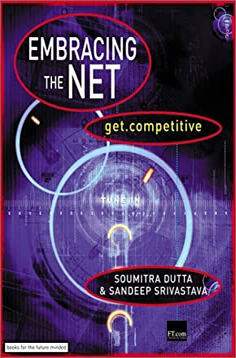
Soumitra Dutta,
Sandeep Srivastava.
Financial Times, UK, in 2000
FIRST INDIAN
And among a handful of others across the globe, to author a book about Internet before the first dotcom bust in 2000!
Embracing the Net, 2000, Financial Times, UK, by Soumitra Dutta, Sandeep Srivastava.
Published during the 2000 dotcom bust, it was among the first ten global books about Internet and the first by Indians.
Soumitra Dutta is the Dean of Said Business School at the University of Oxford.
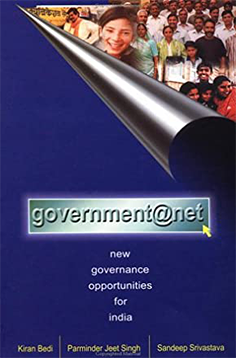
Kiran Bedi, Parminder Jeet Singh, Sandeep Srivastava.
Sage, India in 2001
FIRST PERSON
To author the (world’s first and best-selling) book on e-governance, in 2001, India’s e-governance year.
Government @ Net – by Kiran Bedi, Parminder Jeet Singh, Sandeep Srivastava.
Published in 2001 by Sage, India. The book propositioned that there is nothing virtual about e-governance, it’s about new governance.
Kiran Bedi became the first woman to join the officer ranks of the Indian Police Service (IPS).
Parminder Jeet Singh was a police officer but currently a leading digital society researcher and author.
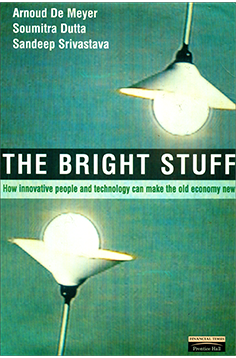
Arnoud De Meyer, Soumitra Dutta, Sandeep Srivastava.
Prentice Hall, USA, 2001
FIRST PERSON
Along with the Co-authors, to publish books on strategies for transforming businesses, both pre- and post-dotcom bust, 2000.
The Bright Stuff: How Innovative People and Technology Can Make the Old Economy New 2001, Prentice Hall, USA, by Arnoud De Meyer, Soumitra Dutta, Sandeep Srivastava.
Published in the aftermath of the 2000 bust, it recommended “Innovation as Strategy”, probably too ahead of its time.
Arnoud De Meyer was the past President of the Singapore Management University (SMU).
PIONEERING FEW
To have authored a narrative on a new world order and later proved the same realisable; the norm being the other way – ‘do and then narrate’.
IYCWorld Softinfrastructure Private Limited (IYCWorld) was established in 2001 and has over the years evolved into a Total Information Technology Solution provider. Headquartered in New Delhi, India, covers the Middle East, Europe and the Indian subcontinent.

my journey as author, educator, and humanist
I graduated as a computer engineer from Jadavpur University, in 1987. Concurrently, I had pursued CMA and completed all the four groups exams in 1990. I pursued M.Tech (Management System), completing the degree in 1992, at IIT, Delhi. Subsequently, studied MBA at INSEAD, Fontainebleau, France, during 1998-99.
I have been an entrepreneur since 2001, founding IYCWorld Softinfrastructure and leading it till 2018. It a showcase of a deeply knowledge-society enterprise – 23-years of ‘no debt, no equity dilution,’ powered solely by world-leading domain (education) and technology leadership. The organic growth as a key strategic design to retain long term focus on research and innovation in education.
I started my career as Assistant Professor on the management and computer faculty at IMT, Ghaziabad, UP. It was followed by Middle management HR role at Modi-Olivetti and ModiCorp (holding company for Xerox, etc. in India). Between 1996-98 I contributed to the HR function of SAMBA (Citibank in Saudi Arabia) at Riyadh. This was followed by INSEAD, books and Entrepreneurship.
Incubating educational enterprises
Seeding ‘next-gen school model’ through innovative entrepreneurship for the young professionals, across nations; including The Liberal School, Math Masters (AI-age math tutors), etc.
Global citizen
Taking a shot at creating the world’s first ‘product’ to be an integral part of ALL 8 billion+ of us, by 2030 – ‘Mathematised Thinking’, ensuring everyone succeeds in K-12 mathematics. It is a long story; briefly, I have created/authored/demonstrated entire K-12 mathematics (conceptually) as a readable narrative in under 50 hours (effortlessly localisable in all languages).
Non-career politician
One of the afflictions of the modern times, but the only one continually sliding south is the state of polity, and political institutions. Only deeply active citizens can reverse the tide; such as being ‘non-career politicians’ – nurturing best political choices and participating as needed to get to those ends. I have contested two elections to the Assembly of the NCR of Delhi.
Incubating social enterprises
Galvanising – intellectually, functionally, and financially – public, ‘free’ socio-economic softinfrastructure to ensure economic dignity of all adults. No less, technology solutions for direct, living democracy is another thrust area (as distinct from technology for government.)
Disruptor
The Family College may well be the most disruptive social product and action in history. It goals to revitalise societies by nurturing its cells – families. Unimagined socio-economic renaissance awaits the most comprehensive empowerment of every family.
Educator
Conceived and created mass-scalable 5-year formal school system for the ‘Industry 4.0’ era, to replace the current, ‘Industry 1.0’ origin K – 12 school system. Researched, experimented, and developed resources and processes for ‘Whole School Transformation’.
Technologist
Among the pioneering batches of computer engineering graduates in India; founded India’s first truly knowledge-led company – no-debt, no-equity dilution in the past 22 years! Debunked the much celebrated ‘Edtech’ industry for learning is essentially social.
Author
Unique pride of writing next-gen, ‘Family edition’ math, science, social science ‘textbooks’ for Grades I – X; and math for XI-XII too! Besides the path-breaking books on Governance, Society, and Education.
THE INSPIRING OTHER
We ‘home educated’ our daughter in Grades VII-XII, and became co-learners in her preparation of math, physics, chemistry, biology, economics and English language as a private student for CIE’s ‘AICE’ (XII) examination, 2014-16.
For the past seven years we have worked in intensely complementary dimensions in education.
My wife and I have lived and worked as (ideally) expected of educated middle-class – proactively nurture the world we want to live in a happier humanity, cutting across all divisions!
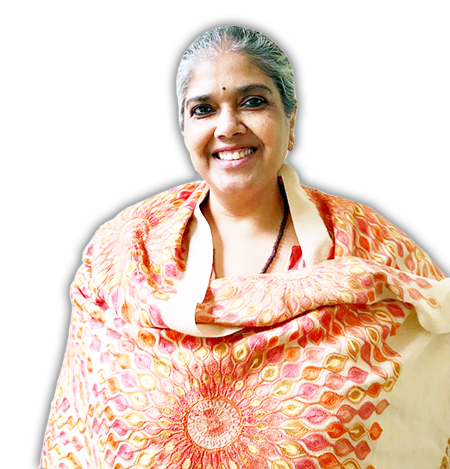
- five
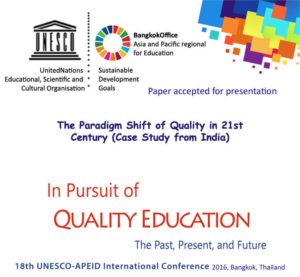 The common thread of what affects quality, running through the four years, are: the school leadership’s ‘definition and expectations of quality’, the language competence of teachers in the academic language for all subjects, the domain competence of the heads of various subject departments, close routine involvement of parents, and language competence of students.
The consistently important input factors for quality include the frequency and (easy) actionability of assessment reports to parents, continuous teacher motivation development, better books and learning materials, career guidance resources and processes and ‘happy socialisation’ in primary school years.
The common thread of what affects quality, running through the four years, are: the school leadership’s ‘definition and expectations of quality’, the language competence of teachers in the academic language for all subjects, the domain competence of the heads of various subject departments, close routine involvement of parents, and language competence of students.
The consistently important input factors for quality include the frequency and (easy) actionability of assessment reports to parents, continuous teacher motivation development, better books and learning materials, career guidance resources and processes and ‘happy socialisation’ in primary school years. - four
 The five most universal indicators of quality education are: minimum dispersion between the top and bottom performance of classes in every scholastic subject,normal distribution of performance of classes in every ‘co-scholastic subject’, open and respectful student-teacher relationships, ‘education-friendly homes’, tuition-free homework/assignment submission.
Srategies that work are – literary-level reading skills in any language of all students, ‘public knowledge of the lesson plans’, level of pre-class preparation by students, the micro nature of assessment and reporting, micro-remedial efforts at home and school, and cumulative progress reporting.
The five most universal indicators of quality education are: minimum dispersion between the top and bottom performance of classes in every scholastic subject,normal distribution of performance of classes in every ‘co-scholastic subject’, open and respectful student-teacher relationships, ‘education-friendly homes’, tuition-free homework/assignment submission.
Srategies that work are – literary-level reading skills in any language of all students, ‘public knowledge of the lesson plans’, level of pre-class preparation by students, the micro nature of assessment and reporting, micro-remedial efforts at home and school, and cumulative progress reporting. - one
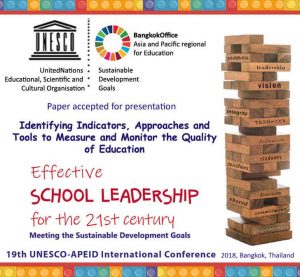 This paper is the analysis of ongoing evaluation of our successful strategies in school management by classifying schools into 9 distinct categories and tailoring optimal leadership performance role definitions/models for each. The 9 school categories emerge essentially from the 3 stages of progressive growth for schools (Effective, Successful, Living) for each of the 3 types of schools (Teacher-centered, Parent-centered, and Student-centered). Effective schools are academic focused, successful schools are overall-development focused, and Living schools are next-gen, ‘boundary-less’ schools.
This paper is the analysis of ongoing evaluation of our successful strategies in school management by classifying schools into 9 distinct categories and tailoring optimal leadership performance role definitions/models for each. The 9 school categories emerge essentially from the 3 stages of progressive growth for schools (Effective, Successful, Living) for each of the 3 types of schools (Teacher-centered, Parent-centered, and Student-centered). Effective schools are academic focused, successful schools are overall-development focused, and Living schools are next-gen, ‘boundary-less’ schools.
This paper presents 9 high-performance leadership models tied to on-ground realities of types of schools and their stage of growth. - Six
 The challenges, which reflect the agenda for further research, are as follows – tools to make it easier for parents to duly complement language and math transaction of their children in school (up to elementary school level), specifically defining the ‘facilitator/co-learner’ role of teachers in the times ahead, development of ‘career discovery and preparation’ curriculum starting early (ideally from middle school), addressing the needs of gifted and talented children in every classroom, and fool-proof strategies for development of ‘slow-learners/weaker students.
To top it all, these five challenges evade effective strategies towards their mitigation, let alone attempts to eliminate them.
The challenges, which reflect the agenda for further research, are as follows – tools to make it easier for parents to duly complement language and math transaction of their children in school (up to elementary school level), specifically defining the ‘facilitator/co-learner’ role of teachers in the times ahead, development of ‘career discovery and preparation’ curriculum starting early (ideally from middle school), addressing the needs of gifted and talented children in every classroom, and fool-proof strategies for development of ‘slow-learners/weaker students.
To top it all, these five challenges evade effective strategies towards their mitigation, let alone attempts to eliminate them. - there
 This paper, clued to research and rooted in on-ground school development strategies, proposes school leadership standards and competencies that will assuredly propel school’s equity and quality goals. However, standards and competencies are all-encompassing, and can’t be developed and applied universally. In this paper standards are mainly focused on making student learning as the end-all mission, whole-person development as core value, educating talented and gifted, multi-dimensional inclusion, teacher-student relationships, micro-curricular organization, parent and community integration, leader’s effectiveness policies, ethical and operational norms, whole-school community and distributed leadership roles.
This paper, clued to research and rooted in on-ground school development strategies, proposes school leadership standards and competencies that will assuredly propel school’s equity and quality goals. However, standards and competencies are all-encompassing, and can’t be developed and applied universally. In this paper standards are mainly focused on making student learning as the end-all mission, whole-person development as core value, educating talented and gifted, multi-dimensional inclusion, teacher-student relationships, micro-curricular organization, parent and community integration, leader’s effectiveness policies, ethical and operational norms, whole-school community and distributed leadership roles.
This paper showcases extensive and sustainable details on standards and scalable competencies. - two
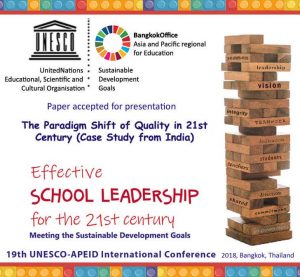 Very many factors influence student outcomes and the quality of school leadership tops the list by a mile. This paper is an ongoing, 12-year action research on exploring diverse models of school leadership in my capacity as a leading school’s co-founder, in India. Literature review on the subject is rich and diverse, but the verdict is still wide open; from Drysdale’s model, ISSPP’s eight models, to tri-model (transformational, instructional, distributive), but none of them are independently applicable. However, talking of ‘performance’, the literature can be divided into models that help create effective schools, versus successful schools.
Very many factors influence student outcomes and the quality of school leadership tops the list by a mile. This paper is an ongoing, 12-year action research on exploring diverse models of school leadership in my capacity as a leading school’s co-founder, in India. Literature review on the subject is rich and diverse, but the verdict is still wide open; from Drysdale’s model, ISSPP’s eight models, to tri-model (transformational, instructional, distributive), but none of them are independently applicable. However, talking of ‘performance’, the literature can be divided into models that help create effective schools, versus successful schools.
This paper uniquely explores and integrates models for a working model of effective school leadership.








